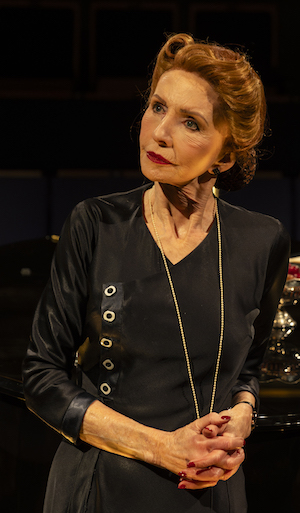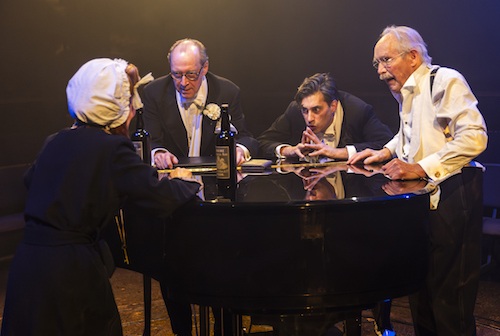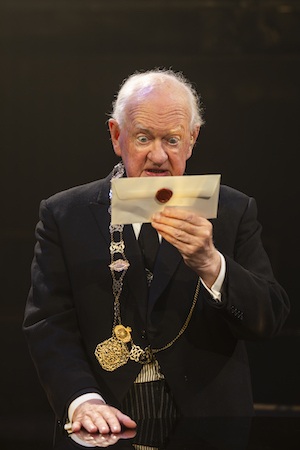It's all too easy to underplay the melancholy of Shakespeare's comedy of divided twins, misplaced – sometimes narcissistic – love, drunken frolics and a Puritan given his comeuppance. Tom Littler's decision to present the action in a very English Illyria during the years following World War II immediately sets the melancholy tone, but with pleasure bursting to make an entrance.
The names of lost soldiers (loved ones nominated by real people) are inscribed in a memorial around the stage, a bell tolls until it rings for victory, and it is clear that Olivia is mourning a brother who has died in battle. Sir Toby (a mischievous Clive Francis), sporting a chestful of medals, has, however, decided it's time to put the sadness aside and have some fun. The palette (in Anett Black and Neil Irish's design) is monochrome except for flame-coloured socks sported by the gloriously dim Sir Andrew played by Robert Mountford, although even he can tap into melancholy: the line "I was adored once too" landed with real sadness among the nonsense.
 To pull off this mix successfully requires seamless, witty ensemble playing and a magic ingredient: Stefan Bednarczyk as Feste, playing the piano and singing Edwardian songs as well as acting with aplomb. His grand takes centre stage on a revolve in the in-the-round space and, apart from a useful cabinet housing necessary props, that's all there is to the set. A piano played a similarly central role in Josie Rourke's celebratory production of As You Like It @Soho Place a couple of years ago, but the mood here is different. The piano player is central to the action, in every sense, as Feste, a clever entertainer with the occasional touch of Coward, who is privy to everyone's plotting and loving.
To pull off this mix successfully requires seamless, witty ensemble playing and a magic ingredient: Stefan Bednarczyk as Feste, playing the piano and singing Edwardian songs as well as acting with aplomb. His grand takes centre stage on a revolve in the in-the-round space and, apart from a useful cabinet housing necessary props, that's all there is to the set. A piano played a similarly central role in Josie Rourke's celebratory production of As You Like It @Soho Place a couple of years ago, but the mood here is different. The piano player is central to the action, in every sense, as Feste, a clever entertainer with the occasional touch of Coward, who is privy to everyone's plotting and loving.
The stories swirl around Feste, often involving the audience directly. When Dorothea Myer-Bennett as Olivia muses on the amorous effect of Cesario, the disguised Viola, she becomes girlish in addressing particular individuals. There is no box tree, of course, so the plotters hide in plain sight among the patrons and even "help" Malvolio with interpreting Maria's crafty letter.
Patricia Allison (famous onscreen in Sex Education) is a strong Viola, mourning her supposedly lost twin, Sebastian (Tyler-Jo Richardson) and Tom Kanji as Orsino seems really to be struck by Feste's hint that he might be less constant than he thinks himself – changeable as taffeta or an opal. Myer-Bennett as Olivia, meanwhile, can turn from imperiousness to giggling in a moment, but it is the older actors who steal the show. (Pictured below, Jane Asher, Stefan Bednarczyk, Robert Mountford and Clive Francis) As Malvolio, Oliver Ford Davies (pictured below left) is a crotchety old grump, but his age and stricken expression add poignancy to the cruel gulling. His gingerly gait, supported by a stick, adds humour to Olivia's instruction to run after Cesario, but there is real sadness in his self-delusion, however ridiculous his behaviour. As Maria, Jane Asher (pictured above right) – in a part amplified with Fabian's lines – has vowels which hint at a less than posh background. She's as pert as a younger Maria might be, just as clever and probably upwardly mobile. She can enjoy the result of her plotting, watching in Fabian's place as Malvolio's reads the forged letter. The lack of Fabian does cause an awkwardness in the final scene however when Maria herself proudly describes her part in proceedings and announces that Sir Toby has married her in gratitude, when she might have wanted to keep a low profile and disappear with her old drunk who is, after all, a knight.
As Malvolio, Oliver Ford Davies (pictured below left) is a crotchety old grump, but his age and stricken expression add poignancy to the cruel gulling. His gingerly gait, supported by a stick, adds humour to Olivia's instruction to run after Cesario, but there is real sadness in his self-delusion, however ridiculous his behaviour. As Maria, Jane Asher (pictured above right) – in a part amplified with Fabian's lines – has vowels which hint at a less than posh background. She's as pert as a younger Maria might be, just as clever and probably upwardly mobile. She can enjoy the result of her plotting, watching in Fabian's place as Malvolio's reads the forged letter. The lack of Fabian does cause an awkwardness in the final scene however when Maria herself proudly describes her part in proceedings and announces that Sir Toby has married her in gratitude, when she might have wanted to keep a low profile and disappear with her old drunk who is, after all, a knight.
 Clive Francis, another veteran, gleefully adds to the dialogue with Sir Andrew as they both indulge in adlibs, almost invariably to hilarious effect. They don't stint on the physical comedy either, dancing round the piano, donning tin hats and accidentally bringing down a pheasant during the duelling scene.
Clive Francis, another veteran, gleefully adds to the dialogue with Sir Andrew as they both indulge in adlibs, almost invariably to hilarious effect. They don't stint on the physical comedy either, dancing round the piano, donning tin hats and accidentally bringing down a pheasant during the duelling scene.
In the final moments, the melancholy mood returns. Among the joyful pairings, Antonio (Corey Montague-Sholay), who saved Sebastian and truly loves him, is forgotten and melts sadly away. Malvolio departs to think about his revenge and Sir Andrew, cast off and used up by Sir Toby, exits with a suitcase. Actually, that isn't the very last moment as the whole cast sing a Christmas ditty around the piano and pleasure wins over pain.
So here is an elaborate concert version of the play which joyfully – and sometimes sadly – finds its heart.















Add comment